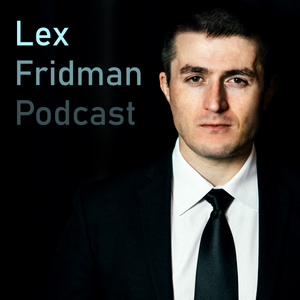
BI 129 Patryk Laurent: Learning from the Real World
03/02/22 • 81 min
Support the show to get full episodes, full archive, and join the Discord community.
Patryk and I discuss his wide-ranging background working in both the neuroscience and AI worlds, and his resultant perspective on what's needed to move forward in AI, including some principles of brain processes that are more and less important. We also discuss his own work using some of those principles to help deep learning generalize to better capture how humans behave in and perceive the world.
- Patryk's homepage.
- Twitter: @paklnet.
- Related papers
0:00 - Intro 2:22 - Patryk's background 8:37 - Importance of diverse skills 16:14 - What is intelligence? 20:34 - Important brain principles 22:36 - Learning from the real world 35:09 - Language models 42:51 - AI contribution to neuroscience 48:22 - Criteria for "real" AI 53:11 - Neuroscience for AI 1:01:20 - What can we ignore about brains? 1:11:45 - Advice to past self
Support the show to get full episodes, full archive, and join the Discord community.
Patryk and I discuss his wide-ranging background working in both the neuroscience and AI worlds, and his resultant perspective on what's needed to move forward in AI, including some principles of brain processes that are more and less important. We also discuss his own work using some of those principles to help deep learning generalize to better capture how humans behave in and perceive the world.
- Patryk's homepage.
- Twitter: @paklnet.
- Related papers
0:00 - Intro 2:22 - Patryk's background 8:37 - Importance of diverse skills 16:14 - What is intelligence? 20:34 - Important brain principles 22:36 - Learning from the real world 35:09 - Language models 42:51 - AI contribution to neuroscience 48:22 - Criteria for "real" AI 53:11 - Neuroscience for AI 1:01:20 - What can we ignore about brains? 1:11:45 - Advice to past self
Previous Episode

BI 128 Hakwan Lau: In Consciousness We Trust
Support the show to get full episodes, full archive, and join the Discord community.
Hakwan and I discuss many of the topics in his new book, In Consciousness we Trust: The Cognitive Neuroscience of Subjective Experience. Hakwan describes his perceptual reality monitoring theory of consciousness, which suggests consciousness may act as a systems check between our sensory perceptions and higher cognitive functions. We also discuss his latest thoughts on mental quality space and how it relates to perceptual reality monitoring. Among many other topics, we chat about the many confounds and challenges to empirically studying consciousness, a topic featured heavily in the first half of his book. Hakwan was on a previous episode with Steve Fleming, BI 099 Hakwan Lau and Steve Fleming: Neuro-AI Consciousness.
- Hakwan's lab: Consciousness and Metacognition Lab.
- Twitter: @hakwanlau.
- Book:
0:00 - Intro 4:37 - In Consciousness We Trust 12:19 - Too many consciousness theories? 19:26 - Philosophy and neuroscience of consciousness 29:00 - Local vs. global theories 31:20 - Perceptual reality monitoring and GANs 42:43 - Functions of consciousness 47:17 - Mental quality space 56:44 - Cognitive maps 1:06:28 - Performance capacity confounds 1:12:28 - Blindsight 1:19:11 - Philosophy vs. empirical work
Next Episode

BI 130 Eve Marder: Modulation of Networks
Support the show to get full episodes, full archive, and join the Discord community.
Eve discusses many of the lessons she has learned studying a small nervous system, the crustacean stomatogastric nervous system (STG). The STG has only about 30 neurons and its connections and neurophysiology are well-understood. Yet Eve's work has shown it functions under a remarkable diversity of conditions, and does so is a remarkable variety of ways. We discuss her work on the STG specifically, and what her work implies about trying to study much larger nervous systems, like our human brains.
- The Marder Lab.
- Twitter: @MarderLab.
- Related to our conversation:
- Understanding Brains: Details, Intuition, and Big Data.
- Emerging principles governing the operation of neural networks (Eve mentions this regarding "building blocks" of neural networks).
0:00 - Intro 3:58 - Background 8:00 - Levels of ambiguity 9:47 - Stomatogastric nervous system 17:13 - Structure vs. function 26:08 - Role of theory 34:56 - Technology vs. understanding 38:25 - Higher cognitive function 44:35 - Adaptability, resilience, evolution 50:23 - Climate change 56:11 - Deep learning 57:12 - Dynamical systems
If you like this episode you’ll love
Episode Comments
Featured in these lists
Generate a badge
Get a badge for your website that links back to this episode
<a href="https://goodpods.com/podcasts/brain-inspired-206251/bi-129-patryk-laurent-learning-from-the-real-world-21441956"> <img src="https://storage.googleapis.com/goodpods-images-bucket/badges/generic-badge-1.svg" alt="listen to bi 129 patryk laurent: learning from the real world on goodpods" style="width: 225px" /> </a>
Copy





